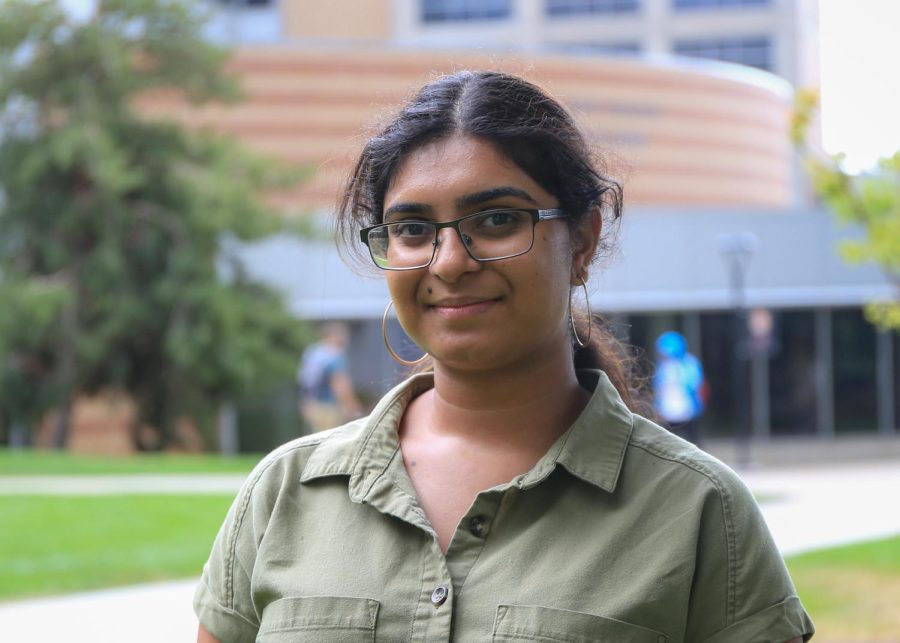Pre-meds Discuss the Future of Obstetrics and Gynecology Post-Roe
University of Utah pre-med student Anila Jonnavithula on campus in Salt Lake City on Sept. 21, 2022. (Photo by Jack Gambassi | The Daily Utah Chronicle)
November 7, 2022
With the overturning of Roe v. Wade leading to severe limits on abortions in states across the U.S., medical doctors practicing in obstetrics and gynecology are left with new restrictions on their practice, leaving questions for the profession.
For doctors in Utah, performing an abortion outside of the exceptions outlined in SB 174 means facing a second-degree felony, which corresponds to up to 15 years in prison or up to $10,000 in fines.
According to the Association of American Medical Colleges, the U.S. is already facing an OB-GYN shortage, with half of U.S. counties lacking a single OB-GYN in 2018. The gap is only projected to increase.
In order to become OB-GYNs, medical school graduates must complete four years of residency training that meets the recommendations set out by the Accreditation Council for Graduate Medical Education. All accredited OB-GYN residency programs in the country must provide access to abortion training for residents, according to AAMC.
According to Johns Hopkins Medicine, procedures such as dilation and curettage, or D&C, are not just used to perform abortions but also to diagnose conditions including cancer and to prevent bleeding and infection after miscarriages. This makes it essential training for those entering the profession.
The overturning of Roe v. Wade means residents in states where abortions are banned or severely restricted will lack access to abortion training and may have to temporarily relocate to other states to receive it. This comes with its own complications, including limited capacity in these programs, costs of travel and complex licensing requirements.
Anila Jonnavithula, Nada Jabbouri and Natalia Garrido are pre-med undergraduate students at the University of Utah hoping to become OB-GYNs. They were drawn to the profession for similar reasons: watching the women in their lives experience the medical system and seeing gaps in their treatment.
“I’m the oldest of six kids … so I have watched [my mom] go through pregnancy under the U.S. healthcare and doctors and kind of hearing stories from other places and comparing it has been really interesting,” said Jabbouri, a fourth-year biology major.
The profession is one that already faces many challenges. According to the Century Foundation and data from the Centers for Disease Control and Prevention, maternal mortality in the U.S. is an outlier among industrialized nations, sitting at 23.8 deaths per 100,000 live births in 2020, with the next highest being 8.7 in France. The overall maternal mortality in the U.S. is also starkly different among different races, with Black mothers facing three times the maternal mortality risk faced by white mothers.
Jonnavithula, a fourth-year biology major, said learning about these disparities and their direct impact on people in her life was a major factor in her decision to pursue the field. It’s also the reason she hopes to become an M.D.-Ph.D.: to both practice as an OB-GYN and be involved in public health policy and research.
“The older I got, the more I realized POCs and other minorities have such biased health care within the reproductive healthcare field,” Jonnavithula said. “They’re less likely to get diagnosed, have higher mortality rates, so that’s kind of what drew me into this field because this also has to do with my own personal life, my mom’s life.”
Jabbouri said she’s concerned that practicing in a state with severe restrictions on abortion would leave her feeling unable to fully put her education and training to use to help patients.
“It made me think there’s definitely some places in the United States that I might have to avoid for fear of being useless,” Jabbouri said. “Dedicating eight years of your life in medical school, four years of undergrad, to kind of be rendered as ‘you can only do certain things.’”
Garrido, a second-year gender studies major who hopes to specialize in family planning as an OB-GYN, said that what state she should train and practice is something she’s given a lot of thought.
“I think that’s always been something on my mind is that I had to go to a more blue state, because of the access and the ability to train with more different types of programs and specialties,” Garrido said.
Jonnavithula said she plans to fight back if education and training on abortion is compromised wherever she ends up. She discussed an incident in July at the University of Michigan medical school, when incoming medical students walked out of their white coat ceremony in protest of an anti-abortion keynote speaker.
“I think that education itself should not be politicized,” Jonnavithula said. “So it makes me unhappy, but it’s not something I would stay quiet on. I will still be an advocate no matter where I go, especially in the case where it’s anti-abortion.”
Jabbouri said that the overturning of Roe exacerbates the fear and dread that many women already experience when seeking out reproductive healthcare.
“For some women, there’s never been a time in [U.S.] history where it’s been necessarily comfortable in a doctor’s office,” Jabbouri said. “Then to add this other complex level of fear … it will definitely negatively affect the patient-doctor relationship within this field, which has already been kind of awkward … [and] scary.”
She said it’s a fear that can be traced back to the dark roots of OB-GYN practices in the U.S. One notable example is J. Marion Sims, a 19th-century gynecologist who performed experimental surgeries on enslaved Black women without their consent and without using anesthesia.
“It was barbaric,” Jabbouri said. “I cannot believe that something that I want to go into, something that could really help somebody was started by people who did not really care for the people. … Some of these discoveries were based on motivations that were deeply sinister, like intentionally inflicting harm on women.”
Jabbouri hopes that men entering the profession are aware of the history and willing to be active participants in making progress.
“I really hope that the people who are trying to get into this field and especially the men right now are conscious of what the environment is like,” Jabbouri said. “And I really, really hope that the men in particular that want to enter this field are doing it for the right reasons.”
Garrido echoed sentiments about acknowledging the history of the practice and learning from past mistakes to make the field better, discussing the importance of being conscious and sensitive to the history of birth control in communities of color. One example she discussed is the Norplant contraceptive, which was available in the U.S. between 1990 and 2002.
“They would incentivize people of color, saying if you get this Norplant birth control, we’ll give you some extra bonus on your Medicaid or your welfare, or they would require them to get Norplant to be eligible,” Garrido said.
Another concerning part of the abortion bill in Utah, Jabbouri said, is the outlined exceptions allowing abortion, which include risk of death or permanent injury for the mother, severe fetal abnormalities and cases of rape or incest reported to the police. She argued this will cause harm to patients by pushing them to the limits of “medical emergency.”
“It’s kind of a violation of the Hippocratic oath … you’re pledging to save lives no matter what,” Jabbouri said. “When the law is, in some cases, outright barring you from doing that, like you can face such severe punishment for doing what you promised … why would the law or why would our government want to try to ask us how far we could go? Both as women [and] as patients.”
Garrido said she thinks the criminalization of abortion will negatively affect patient care.
“It takes away the time I can be empathetic and caring and be there for the patient,” Garrido said. “It takes that time away for me thinking, is this legal? Am I gonna have to call a lawyer for this? Can I do this? Is this truly a medical emergency?”
Despite their concerns, none of the students have been deterred from their plans to enter the field. If anything, they said it has reinforced their commitment to make it into these positions and change the field for the better.
“On a future professional level, [Roe being overturned] just motivated me more to push for medical school, and to be an OB-GYN and to be in family planning,” Garrido said. “I think that anger and that sadness and hearing [from] so many people is just a motivator for me to keep going because it’s going to hurt most marginalized communities and me being Hispanic, I want to be able to help those people who also identify as that … they probably need me in the future more than ever.”
they probably need me in the future more than ever.
— Natalia Garrido
Jonnavithula said she would be willing to practice in a state where abortion is severely limited for as long as she is able to, keeping in mind that people in those states need providers to advocate for them too.
“If all the OB-GYNs who still care about abortion rights move out of red states, there won’t be anyone to advocate for the women in those states,” Jonnavithula said. “I would fight for a couple of years until it’s emotionally and mentally draining … I would probably stay until I couldn’t.”









